nn
n
n
n
nOn the 18th of June, 1812, the Orders in Councilnwere repealed, and the blockaded port thrown open. You know very well – such ofnyou as are old enough to remember – you made Yorkshire and Lancashire shakenwith your shout on that occasion: the ringers cracked a bell in Briarfieldnbelfry; it is dissonant to this day.n
nCharlotte Brontë Shirley (1849)n
n
n
n
nnn
n The Orders in Council (1807) were a consequence of thenNapoleonic Wars, and were a series of mercantile embargoes placed on trade withnFrance and her allies by the British, leading to the blockade of Europeannports, and retaliatory actions on British ports by the French. They led to,namongst other things, increased trade with British colonies overseas, a cottonnfamine in Lancashire and Yorkshire, and the War of 1812 between Britain andnAmerica. One of the politicians who advocated free trade with Europe, leadingnto the Orders being repealed, was Henry Peter Brougham.
n
n
n
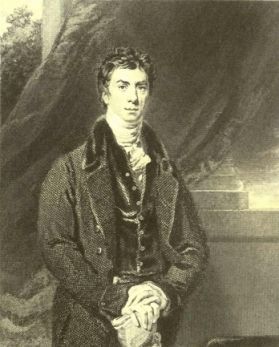 |
| Henry Peter Brougham |
n
n
n
nCommon sense tells younthat Brougham (pronounced Broom) ought to be the sort of chap that you admirenwithout a second thought (but more on that tomorrow). He was an outspoken opponent of the slave trade andninstrumental in its abolition.
n
n
n
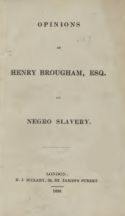 |
| H Brougham – Negro Slavery – 1830 |
n
n
n
nAs Lord Chancellor, he supported the 1832 ReformnAct, which removed many of the ‘rotten boroughs’ and greatly increased thenfranchise for those eligible to vote in general elections. He was in favour ofnuniversal education for adults, and encouraged the working poor to attendnmechanics’ institutes, where they would have easy access to books (in the daysnbefore public libraries) and education.
n
n
n
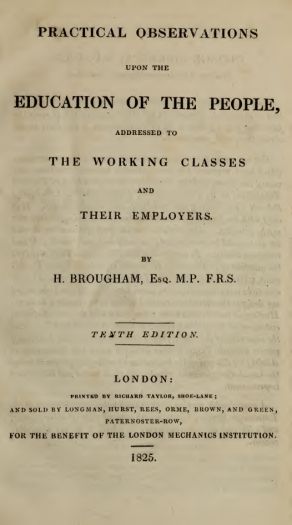 |
| Henry Brougham – Practical Observations – 1825 |
n
n
n
nIn his Practical Observations upon thenEducation of the People (1825), he suggests that even the poorest working mannmight put aside one or two pennies per week, with which he might buy books and,nif several workers banded together, they might exchange these books betweennthemselves, increasing the availability of texts that they might read.
n
n
n
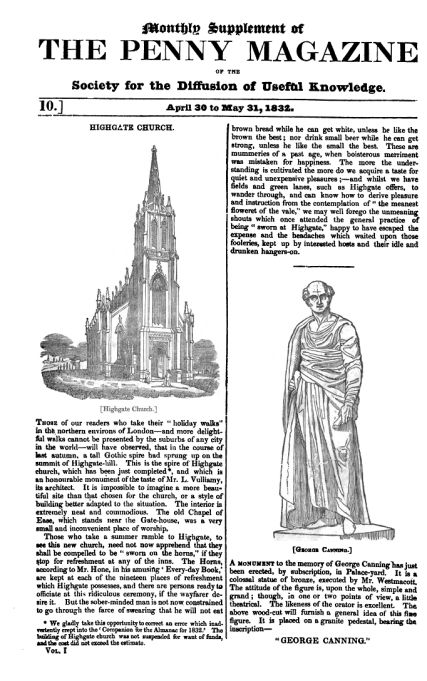 |
| Monthly Supplement to the Penny Magazine |
n
n
n
nAs andirect result of these proposals, Brougham came up with the idea of publishingncheaply priced text-books and The Society for the Diffusion of Useful Knowledgenwas born in 1826. The first venture was the publication of the Library ofnUseful Knowledge, a series of bi-weekly books on a variety of subjects,navailable for sixpence a copy.
n
n
n
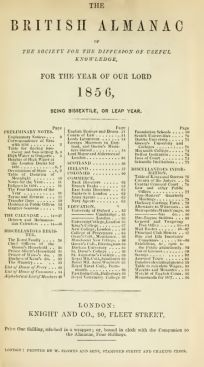 |
| The British Almanac – 1856 |
n
n
n
nThe British Almanac was founded in 1828, and wasna deliberate attempt to produce a credible, factual alternative to the nonsensenthat appeared in the popular almanacs that were circulated in great numbers atnthe time. These ‘astrological’ almanacs were nothing more than guesswork putninto print, but they held great sway over the credible public – it is said thatnfarmers would not go out in a morning to harvest their grain if their almanacnsaid that there would be heavy rain on that day, in spite of the thing havingnbeen written months previously, and in spite of their seeing it to be anperfectly fine, sunny day.
n
n
n
 |
| Library of Useful Knowledge – Natural Philosophy – 1829 |
n
n
n
nIn the late eighteenth century, Edmund Burke hadnestimated that there were eighty thousand readers in Britain; forty years laternThe Penny Magazine was selling two hundred thousand copies of each issue, withnan estimated readership of about one million (in a population of about sixteennmillion).
n
n
n
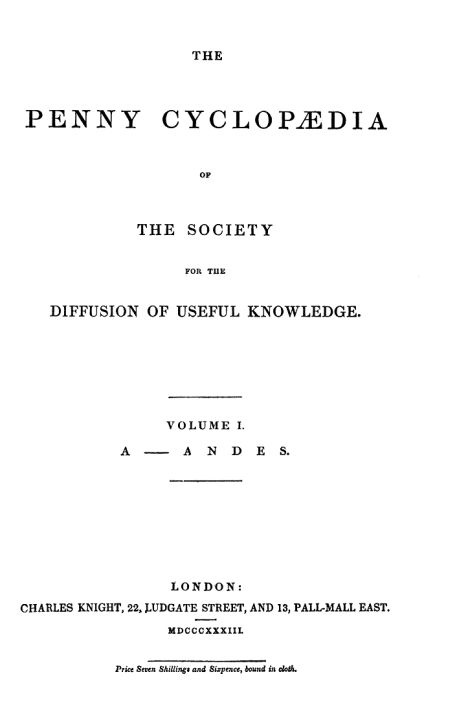 |
| The Penny Cyclopaedia – 1832 |
n
n
n
nIn 1832, the Society began publication of the Penny Cyclopaedia,nwhich began as a weekly part-work of eight pages, but the following year movednto two issues per week, and continued for ten years, completed in twenty-sevennvolumes, with two additional supplements. Copiously illustrated andnwide-ranging, it was an ambitious enterprise but quite a commitment for thenaverage working man.
n
n
n
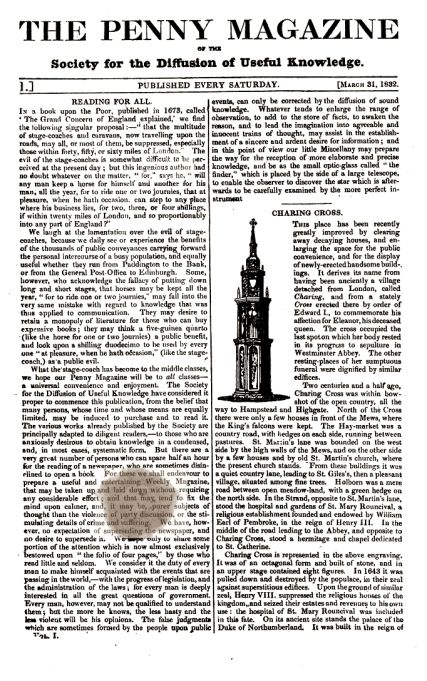 |
| The Penny Magazine – March 31 1832 |
n
n
n
nAt the same time, from March 31st 1832, thenSociety launched The Penny Magazine, an educational weekly paper that sought toninform its readers on all manner of the arts and sciences. It lacked thenstructure of the Cyclopaedia, but allowed for subjects to be treated in greaterndepth, which was something of a two-edged sword.
n
n
n
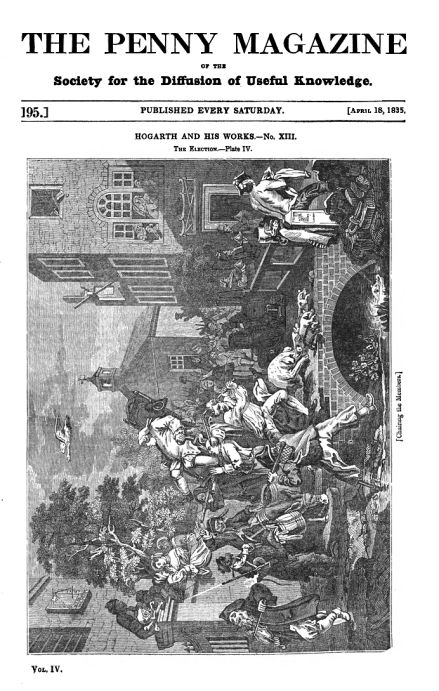 |
| The Penny Magazine – April 18th 1835 |
n
n
n
nThe Penny Magazine was aimednat the lower- and middle- classes, and the problem with the Society for thenDiffusion of Useful Knowledge was its selective, if not down-right patronising,napproach to what was deemed ‘useful’.
n
n
n
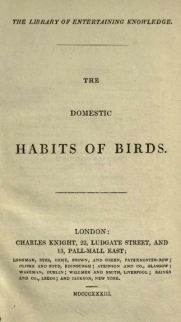 |
| The Domestic Habits of Birds – 1833 |
n
n
n
nSome of the volumes in the Library werenobviously useful, if not to everyone, with such titles such as Cattle – theirnbreeds, management and diseases (1834), or The History, Treatment and Diseasesnof the Horse (1848), and at a mere sixpence each, were an clear boon to theirnintended audience.
n
n
n
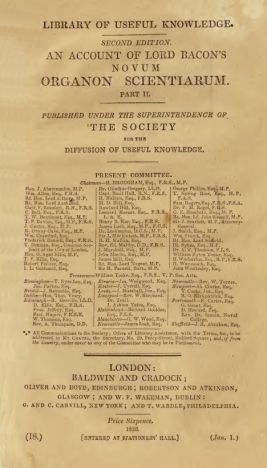 |
| Bacon’s Novum Organon – 1828 |
n
n
n
nBut one has to wonder how popular with the averagenworking-man were such titles as The Differential And Integral Calculus (1842), AnnExplanation Of The Gnomonic Projection of The Sphere; And of Such Points ofnAstronomy as are Most Necessary in the Use of Astronomical Maps (1836) or PartnII of Bacon’s Novum Organon Scientiarum (1828).
n
n
n
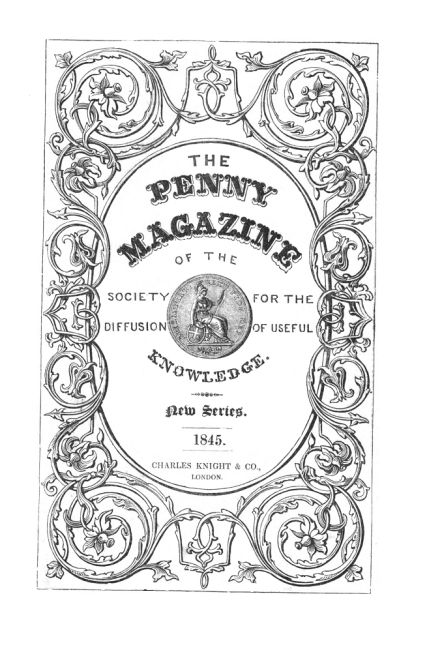 |
| The Penny Magazine – 1845 |
n
n
n
nSimilarly, in the PennynMagazine, there were articles of great general interest alongside dry-as-dustnexpositions on the Quadrature of the Circle, Statistical Notes on Welsh CoppernMines or On the Importance of a Public Declaration of the Reasons of Decisionsnin the Courts of Justice.
n
n
n
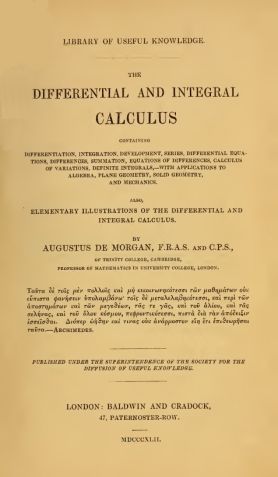 |
| The Differential and Integral Calculus – 1842 |
n
n
n
nThe aims and high ideals of the Society werenundoubtedly well-meant but its Whiggish tone and authoritarian attitude did notnsit well with its intended audience and the Society faltered, with the PennynMagazine folding in 1845, and the Society ceasing to exist entirely in 1848,nalthough later works under its imprint were published, (The British Almanac continued until 1897).
nnn
n
n
n
nnnTomorrow – Brougham – Not such a great guy after all …
